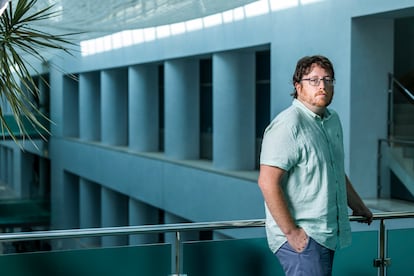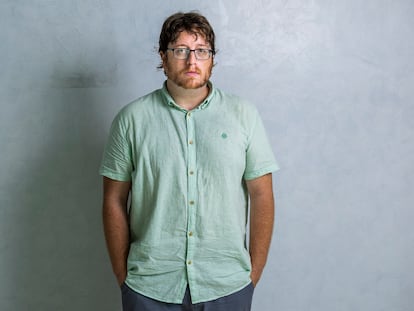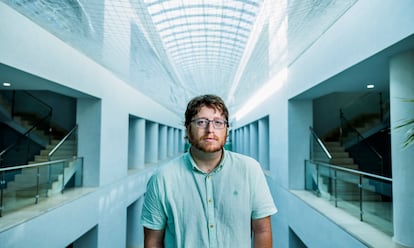Emilio Santiago, anthropologist: ‘Collapsist discourses are taking environmentalism into a political dead end’
In a new book, the Spanish National Research Council (CSIC) scientist warns against the mistaken idea that we are headed for a societal collapse, which he considers counterproductive: ‘It’s a myth, it’s not about science, it’s about ideology’


For a long time, Emilio Santiago Muíño prepared himself for the collapse. He spent almost 15 years of his life among those who warn that we are heading towards a rapid collapse of industrial civilization; a catastrophic vision that takes many different forms, and is spreading within environmentalism, particularly in Spain. However, the anthropologist, who now has a tenured position in climate anthropology at the Spanish National Research Council (CSIC), has just published a book entitled Contra el mito del colapso ecológico [Against the Myth of Environmental Collapse] in which he tries to dismantle these collapsist discourses methodically, labelling them mistaken and counterproductive.
Question. What stopped you waiting for the collapse?
Answer. There were several reasons. The first is that we spent years preparing for the collapse, and what arrived was the 15-M (anti-austerity movement in Spain in 2011). I think that’s a very graphic way of summing up that things are going to be more complex and with more opportunities for intervention than collapsism maintains. Afterwards, I held a politically responsible position as director of the environment at Móstoles City Council [in Madrid] and I realized that to operate politically in our society, collapsist discourses were of no use. But more importantly, the forecasts no longer matched reality. It had been predicted that we would only see economic recovery with very high energy prices, because we had entered a crisis from which we would never emerge. But in 2016-2017, it was clear that the global economy was growing, and energy prices were not soaring.
Q. What are these collapsist discourses, and why do you think they are wrong?
A. Collapse is a myth; it is not about science, it is about ideology. The discourses are diverse. There are people who consider collapse a fait accompli, and people who think we still have some room for action. There are those who understand it in a rigorous way, as a sudden, rapid collapse of the modern order, and those who use the term collapse, but are referring to something else. Then there are those who understand that this will be a tragedy, but also a window of opportunity to build more decentralized, simpler, locally based societies, which is where collapsism overlaps with anarchist theory. There are a variety of discourses that put collapse at the center of environmentalist imaginations, and this is problematic. Collapsist discourses take environmentalism into a political dead end at a key moment in which it has an immense responsibility to lead a social transformation of enormous significance. And this happens because of ideas based on mistaken science and erroneous theory.
Q. Some of the people behind these discourses in Spain refuse to be called collapsists.
A. I come from there, from the collapsist ideology. It is a controversial concept because, like all ideological labels, it makes simplifications, but collective debates are also based on labels and I think it is not too problematic.
Q. Why write a book warning about these discourses?
A. It is important because the discourses of collapse are politically counterproductive. This is so obvious that even many of the people who champion these discourses admit it. But, in addition, its foundations are scientifically biased and apply a very poor social theory. In the end, this results in a collection of forecasts that have a tendency to fail, that also demotivate the public and nurture a sense of resignation. And they lead environmentalism to make political assumptions that are highly problematic.

Q. But your vision of the future is not very promising either.
A. At no time did I want to minimize the problems we face. Humans are the most widespread planetary force, influencing every process on the Earth’s systems, but we have no control over any of them. We really have a difficult situation in which the future could be much worse. We have become guinea pigs in a planetary experiment that is out of control, but just because the future is difficult does not mean we are doomed to fail. Throughout history, humans have carried out more difficult social transformations than complying with the Paris Agreement [the international treaty against climate change] and what it is all about is not losing that transformative impulse.
Q. In the book you say that collapse in Spain is closely linked to “peak oil” theories (oil depletion). Isn’t it?
A. In terms of scientific diagnosis, the collapse in Spain is particularly linked to a whole series of ideas about the energy crisis. Basically, there are two main ideas in this discourse: one is the imminent decline of fossil fuels, which are the foundation of industrial civilization, and the other is the limits of renewable energies to sustain a modern society.
Q. On the first point, you say that what we should be worried about today is not that oil will run out, but just the opposite, that we will not be able to curb its extraction and cut the emissions that are causing the climate crisis.
A. That is not my assertion, but some of the voices that helped set the discourse of peak oil in the early 2000s say that. In other words, many of the experts who alarmed us with warnings about the scarcity of oil have now realized that there is enough commercially extractable oil to breach the Paris Agreement. Therefore, the concern is no longer so much a supply peak that leads to energy shortages, but how we as a society cause a peak in demand.
Q. These collapsist discourses also argue that renewables cannot replace fossil fuels to sustain today’s industrial society.
A. It is clear that renewable energies have limits, but such an important statement is, to say the least, exaggerated. We are not certain about this, because it is an open debate. There is no IPCC [the expert panel that agrees on the science of climate change] for energy, meaning there is no scientific consensus. The scientific discourses are weighing up a huge number of possibilities regarding the potential of renewables. It is an open debate, with many uncertainties. That said, the closest thing to a consensus, although it does not exist, tends to get further and further away from the most pessimistic assumptions.

Q. You even claim that research is increasingly showing that 100% renewable energy systems are not only viable but also cost-effective.
A. Authors such as Ugo Bardi, who helped a lot to consolidate the peak oil hypothesis at the time, are today publishing papers with the great renewable energy gurus, such as Mark Jacobson, and basically affirming the same thing: not only can renewable energies sustain a complex society, but they are also more profitable, in most countries. Another thing is that the world to which it gives rise is going to be our same world. There will be important transformations, but there is a long way to go from that point to the collapse of modern society.
Q. Why do you claim that environmentalism has given up on the future?
A. It has not always been the case. Environmentalism is a transformative movement that has always made trade-offs between fear and hope. Fear of a looming environmental disaster and hope that the trajectory could be changed. In recent decades, especially in recent years, as a result of the worsening environmental crisis, fear has won out over hope within the environmentalists’ heartland, and they are giving up on the future. In other words, they have renounced the basic premise of emancipatory movements, which is that the world can be transformed.
Q. What should change?
A. We need environmentalism that is able to inspire hope, and suggest a path to a better life. People cannot understand the ecological transition in terms of sacrifice, they have to understand it in terms of gain. Environmentalism has always bet on the power of truth, on speaking the truth as something that will have a political effect, and I think this is a mistake. Environmentalism must make an argument for desire. It will be the ambition to create a society that people want to live in that will allow us to win politically.
Q. Does your case show that there is already a part of environmentalism that rejects this pessimistic view?
A. Faced with the defeatism and pessimism of the myth of collapse, with books that have been so successful, such as Learning to Live and Die in the Anthropocene [by Roy Scranton], there is a certain rebellion within environmentalism. There are those people who say that they don’t want to learn to die in the Anthropocene, that it is not too late, that the future can be better, and that we don’t have to be worse off than our parents. If the discourse of discouragement has gained ground in recent years, of course there has been a reaction to it.
Q. Are collapsism and degrowth two sides of the same coin?
A. It is important to separate them. Collapse is not degrowth. In fact, I myself advocate that we have to degrow. And the international degrowth movement is not collapsist at all. Another thing is that the discourse of degrowth, as it is being formulated, is politically useful. But I share and defend the idea that we must scale down the economy’s material sphere of production.
Q. Some voices criticize environmentalism for getting involved in this type of debate when the urgent thing is to tackle the climate crisis. What do you think?
A. To deny a debate that exists is worse, because there are different strategies that are partly incompatible. What is needed is to have the debate maturely and constructively. Many fellow collapsers are friends and people I appreciate. But this does not mean that I do not believe that they are mistaken and that this mistake is counterproductive for environmentalism as a whole and for society in general.
Sign up for our weekly newsletter to get more English-language news coverage from EL PAÍS USA Edition
Tu suscripción se está usando en otro dispositivo
¿Quieres añadir otro usuario a tu suscripción?
Si continúas leyendo en este dispositivo, no se podrá leer en el otro.
FlechaTu suscripción se está usando en otro dispositivo y solo puedes acceder a EL PAÍS desde un dispositivo a la vez.
Si quieres compartir tu cuenta, cambia tu suscripción a la modalidad Premium, así podrás añadir otro usuario. Cada uno accederá con su propia cuenta de email, lo que os permitirá personalizar vuestra experiencia en EL PAÍS.
¿Tienes una suscripción de empresa? Accede aquí para contratar más cuentas.
En el caso de no saber quién está usando tu cuenta, te recomendamos cambiar tu contraseña aquí.
Si decides continuar compartiendo tu cuenta, este mensaje se mostrará en tu dispositivo y en el de la otra persona que está usando tu cuenta de forma indefinida, afectando a tu experiencia de lectura. Puedes consultar aquí los términos y condiciones de la suscripción digital.








































